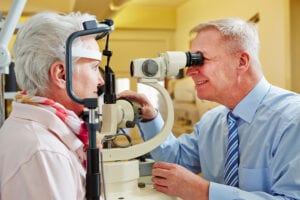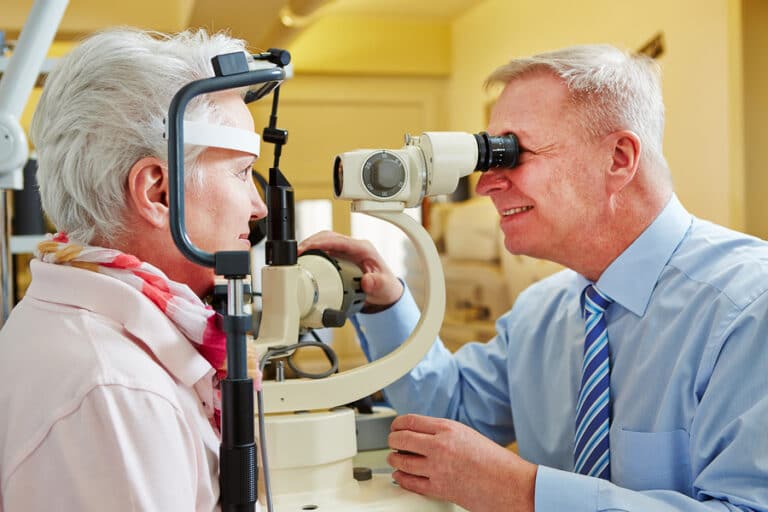Seniors are at risk for vision-affecting eye conditions including macular degeneration, cataracts, glaucoma and diabetic retinopathy. Vision loss affects seniors’ daily life profoundly. By understanding how to support a senior with vision loss, family members can enable them to live their best life as independently as possible. Experts recommend increasing lighting, ensuring safe walkways, and asking for and accepting support where needed.
Increase Lighting
Adequate lighting is vital for seniors with low vision. Bright, consistent lighting with minimal variations or dark spots is best. Installing extra lighting in areas where the senior will be using focused eyesight (such as reading or crafting) can help. Don’t forget to light areas such as:
- Inside cabinets and closets

Elder Care Fair Oaks, CA: Seniors and Vision Loss - Above countertops or stoves
- Stairwells, landings, hallways and walkways
- Outdoor pathways
Ensure Safety
Low vision increases a senior’s risk for falling. Ensure wide, clutter-free walkways around furniture and install grab-bars in bathrooms to prevent falls. Add threshold ramps to doorways and remove throw rugs to reduce the chance of tripping.
Get Help Where Needed
Elder care services are able to support seniors with low vision in the specific areas where they most need it, so that they can enjoy maximum independence and quality of life.
Help with Meal Prep
Although it’s possible to prepare meals with low vision, for some seniors it takes a lot of energy to do so. Preparing nutritious meals is so important to every aspect of a senior’s wellness, but it can be more challenging than opening a can of sodium-laden soup or a pre-packaged entree. Some seniors may appreciate having tasty, nutritious meals prepared for them ahead of time. When it’s time to eat, heating up the food is much easier — and less exhausting — than making a whole meal. Elder care aides can cook food as often as desired, whether that means preparing it ahead of time, or fresh for each meal. Elder care aides also can clean up after meal preparation!
Shopping and Errand Support
Driving is obviously off the table for seniors with low vision, but the other aspects of shopping and errands can be challenging as well. Getting in and out of a bus or taxi, navigating stores and counting money can become problematic. Elder care aides can pick the senior up at home on their own time schedule. They can assist them to get ready to go, help them in and out of the car, and carry bags or packages for them. They can act as their eyes in the store, differentiating between bills, reading price tags, shopping lists or package information. They can even run the errands while the senior relaxes at home, if preferred!
Reading and Hobbies
Engaging in hobbies and meaningful activities is important for all humans. While low vision can make these things more challenging, elder care aides can help in a number of ways. For example:
- Reading aloud
- Setting up or assisting with art or craft supplies at the senior’s direction
- Driving the senior to a class or other activity
Elder Care Support is Personalized
Seniors with vision loss can get help from talking watches and smart devices, magnifying glasses and other technological advancements, but sometimes there’s just no substitute for a helping human hand. Elder care aides offer a kind ear and helping hand for many of the challenges of living life with low vision.
If you or an aging loved one needs elder care services near Fair Oaks, CA, remember Senior Home Care Services. Call us at (916) 514-7006 for more information.
Sources
https://www.acb.org/are-you-senior-citizen-struggling-vision-loss
- Helping Seniors Reduce Health Anxiety - April 18, 2025
- Why Should Seniors Consider Adding Soy to Their Diets? - April 7, 2025
- Four Ways to Celebrate Spring With Your Homebound Elderly Loved One - April 2, 2025


